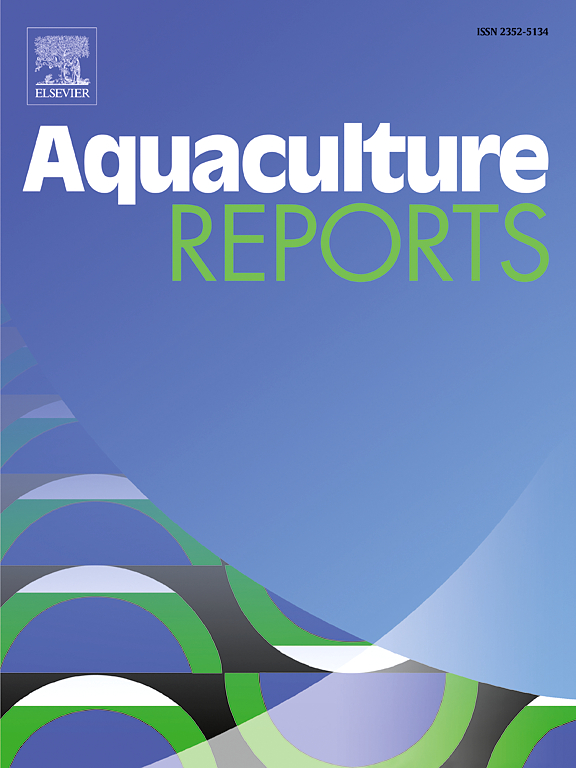Aeration remodels the gut bacterial community and co-metabolic profile in sea cucumber (Apostichopus japonicus)
IF 3.2
2区 农林科学
Q1 FISHERIES
引用次数: 0
Abstract
Aeration is a crucial method for disrupting water stratification and enhancing the living conditions of the cultured species in the process of pond aquaculture. The mechanism by which sea cucumber (Apostichopus japonicus) gut microbiota and metabolism in response to aeration are poorly understood. In the present study, we exposed the A. japonicus to aerated ponds and non-aerated ponds for 60 days. To address the aeration effect on gut microbiota and metabolism, the gut bacteria and metabolites of A. japonicus was assessed using the 16S rRNA sequencing and metabolomics technology. The results showed that the diversity and abundance of the gut microbiota of A. japonicus increased significantly after aeration, and the aeration treatment significantly changed the structural composition of the gut microbiota of A. japonicus. Among them, the relative abundance of Vibrio decreased by 12.86 %, and the relative abundance of Photobacterium and Ruegeria both increased by more than 500 %. A total of 102 differential metabolites were screened by metabolomics, of which 70 metabolites were significantly up-regulated and 32 metabolites were significantly down-regulated. Further metabolic pathway enrichment analyses revealed that aeration affects arachidonic acid metabolism, linoleic acid metabolism, and inflammatory mediator regulation of TRP channels through pathways that promote the accumulation of diglyceride and phosphatidylcholine. Through the Pearson correlation analysis found that Photobacterium, Ruegeria are positively correlated with anti-inflammatory substances such as phosphatidylcholine, l - pyroglutamic acid, Acetyl - dl – carnitine and betaine, Vibrio and Tepidibacter showed a significant negative correlation with them. The results suggested that aeration improves the physiological state of the organism by affecting the gut microbial composition and host metabolic state of A. japonicus indirectly. This study provides a theoretical basis for the healthy and enhanced cultivation of A. japonicus.
求助全文
约1分钟内获得全文
求助全文
来源期刊

Aquaculture Reports
Agricultural and Biological Sciences-Animal Science and Zoology
CiteScore
5.90
自引率
8.10%
发文量
469
审稿时长
77 days
期刊介绍:
Aquaculture Reports will publish original research papers and reviews documenting outstanding science with a regional context and focus, answering the need for high quality information on novel species, systems and regions in emerging areas of aquaculture research and development, such as integrated multi-trophic aquaculture, urban aquaculture, ornamental, unfed aquaculture, offshore aquaculture and others. Papers having industry research as priority and encompassing product development research or current industry practice are encouraged.
 求助内容:
求助内容: 应助结果提醒方式:
应助结果提醒方式:


